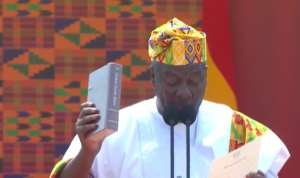
Performance Overview
President John Dramani Mahama’s administration has been active since January 7, 2025. In the first month, his administration has focused on resetting the nation’s agenda to address pressing challenges. Key areas of focus include governance, economic recovery, education, social welfare, and security.
Key Achievements
1. Governance and Institutional Reforms:
– Reduced the number of ministries from 30 to 23 to cut government expenditure.
– Constituted a Constitution Review Committee to assess and recommend changes to the 1992 Constitution.
– Suspended the use of public funds for the National Cathedral project.
2. Economic Recovery:
– Formed an Economic Dialogue Planning Committee to engage stakeholders on economic recovery.
– Set up a Tripartite Committee to negotiate the minimum wage and base pay of public sector workers.
– Directed the Environmental Protection Agency (EPA) to halt illegal mining in forests and water bodies.
3. Education and Social Interventions:
– Reduced University of Ghana residential facility fees from GHS3,000 to GHS2,500.
– Allocated stored food from Tema warehouses to various Senior High Schools to address food shortages.
– Formed an 8-member Education Forum Planning Committee to review and improve the education sector.
4. Security and Justice:
– Engaged key stakeholders to restore peace in Bawku, a longstanding conflict-prone area.
– Requested the Inspector General of Police (IGP) to investigate deaths during the 2020 and 2024 elections.
– Tightened fire surveillance at markets, ordering the Ghana National Fire Service (GNFS) to position fire tenders near major markets.
5. Social Welfare and Humanitarian Actions:
– Donated GHS1 million to victims of the recent Kantamanto fire.
– Announced the 2025 Hajj Fare, which is GH¢13,000 cheaper than last year.
Challenges and Areas for Improvement
While the administration has made significant strides, there are areas that require attention:
– Economic Stability: The administration needs to ensure that the economic recovery plans are sustainable and inclusive.
– Education: Continued efforts are needed to address the challenges in the education sector, including infrastructure and teacher training.
– Corruption: The ORAL Committee’s report on corruption cases and the directive to investigate these cases is a step in the right direction, but effective implementation is crucial.
Suggestions and Recommendations
1. Enhance Transparency: Ensure that all government actions and decisions are transparent and communicated effectively to the public.
2. Strengthen Anti-Corruption Measures: Implement robust measures to tackle corruption and hold accountable those involved in corrupt practices.
3. Promote Economic Diversification: Focus on diversifying the economy to reduce dependency on a few sectors and create more job opportunities.
4. Invest in Education: Allocate more resources to improve the quality of education and address infrastructural deficits.
5. Engage Stakeholders: Continue to engage with various stakeholders, including civil society organizations, to gather input and build consensus on key issues.
6. Nationalizing Ghana’s natural and mineral resources is essential to ensure that the wealth generated from these assets directly benefits the nation and its people. By taking control of these resources, Ghana can reinvest the revenues into critical areas such as infrastructure, healthcare, education, and social services. This strategic reinvestment would lead to the development of modern infrastructure, improved healthcare delivery systems, and enhanced educational facilities, ultimately boosting the nation’s socio-economic development. Furthermore, nationalization can help reduce foreign dependency, create job opportunities for Ghanaians, and ensure a fairer distribution of wealth. This approach aligns with the broader goals of economic independence, social equity, and sustainable development, paving the way for a prosperous future for all citizens.
In conclusion, President John Dramani Mahama’s administration has shown a proactive approach in addressing Ghana’s challenges within the first month. However, sustained efforts and effective implementation of policies will be crucial to achieving long-term success. The administration’s commitment to transparency, anti-corruption measures, and stakeholder engagement will be key factors in building trust and ensuring progress.
Retired Senior Citizen
Teshie-Nungua


